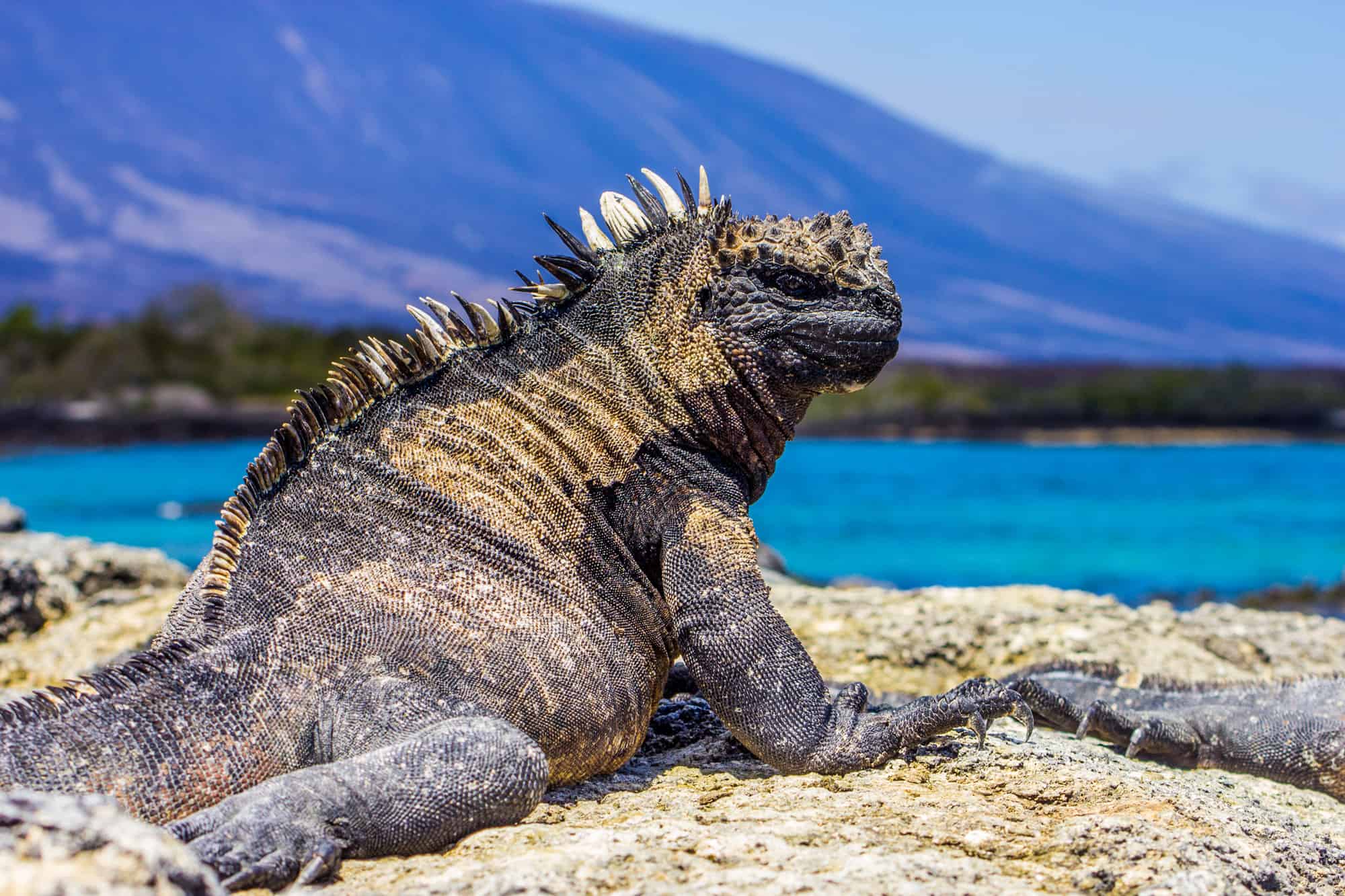
The marine iguana, often dubbed as "the lizard of the sea," is a fascinating creature that inhabits the Galápagos Islands. These unique reptiles have captivated the curiosity of wildlife enthusiasts and researchers alike. From their exceptional adaptations to their intriguing behaviors, marine iguanas boast a myriad of captivating traits that set them apart from other species.
In this article, we will delve into 16 enthralling facts about marine iguanas, shedding light on their remarkable features, evolutionary marvels, and their vital role in the ecosystem. Whether you're a wildlife aficionado or simply intrigued by the wonders of the natural world, these insights will unveil the captivating world of marine iguanas and leave you in awe of their extraordinary existence. So, let's embark on a journey to uncover the mesmerizing secrets of these remarkable reptiles.
Key Takeaways:
- Marine iguanas are the only lizards that swim in the ocean, hold their breath for 30 minutes, and change colors during breeding season, making them unique and fascinating creatures of the Galápagos Islands.
- Marine iguanas play a vital role in the Galápagos ecosystem by consuming algae, facing natural threats, and attracting ecotourism, highlighting their importance in conservation efforts and the delicate balance of nature.
Marine Iguanas are Unique to the Galápagos Islands
The Galápagos Islands are home to a remarkable creature known as the marine iguana. These fascinating reptiles have captivated the attention of scientists and nature enthusiasts for decades due to their extraordinary adaptations and behaviors. Let's delve into 16 great marine iguana interesting facts that shed light on the remarkable world of these intriguing creatures.
Marine Iguanas are the Only Ocean-Going Lizards
Marine iguanas are the only lizards in the world that have adapted to foraging in the ocean. Their unique ability to swim and dive for algae sets them apart from all other lizard species. This remarkable adaptation allows them to exploit a niche that no other reptile can occupy.
Marine Iguanas Can Hold Their Breath for Up to 30 Minutes
When marine iguanas dive for algae, they can remain submerged for an astonishing 30 minutes. This remarkable breath-holding ability enables them to access food sources that are inaccessible to other herbivores, showcasing their exceptional evolutionary traits.
Marine Iguanas Undergo Dramatic Color Changes During Breeding Season
During the breeding season, male marine iguanas undergo a striking transformation. Their skin and scales turn vibrant shades of red and green, creating a mesmerizing display of colors. This dramatic change plays a crucial role in attracting mates and establishing dominance within the population.
Marine Iguanas are Endemic to the Galápagos Islands
These captivating reptiles are found exclusively in the Galápagos Islands, making them a symbol of the region's unique biodiversity. Their isolated habitat has spurred the evolution of distinct traits, rendering them a true emblem of the Galápagos ecosystem.
Marine Iguanas Are Vulnerable to Environmental Disturbances
As the Galápagos Islands face environmental challenges, marine iguanas are particularly vulnerable to disruptions in their habitat. Their specialized foraging and nesting sites make them sensitive to changes in ocean temperature and food availability, highlighting the delicate balance of their existence.
Marine Iguanas Have Salt-Secreting Glands
To survive on a diet of marine algae, marine iguanas have evolved specialized salt-secreting glands that expel excess salt from their bodies. This unique adaptation enables them to thrive in an environment where freshwater sources are scarce, showcasing their remarkable physiological resilience.
Marine Iguanas Are Excellent Swimmers
Despite being primarily terrestrial, marine iguanas are proficient swimmers, using their powerful tails to propel themselves through the water with impressive agility. Their streamlined bodies and strong limbs allow them to navigate the coastal waters in search of nourishing algae beds.
Marine Iguanas Bask in the Sun to Regulate Their Body Temperature
After foraging in the cold ocean waters, marine iguanas rely on basking in the sun to raise their body temperature. This behavior helps them maintain optimal metabolic functions and prepares them for their next aquatic foraging expedition.
Marine Iguanas Play a Vital Role in the Ecosystem
As herbivores, marine iguanas contribute to the balance of the Galápagos ecosystem by consuming algae and preventing overgrowth in coastal areas. Their ecological role as primary consumers influences the dynamics of marine habitats, underscoring their significance in the island chain's biodiversity.
Marine Iguanas Face Predation from Natural Threats
Despite their unique adaptations, marine iguanas face predation from native and introduced species on the Galápagos Islands. Natural threats such as hawks and snakes pose challenges to their survival, emphasizing the ongoing struggle for these remarkable reptiles in their native environment.
Marine Iguanas Exhibit Intriguing Social Behaviors
During the breeding season, male marine iguanas engage in elaborate displays to establish dominance and court potential mates. These social interactions provide a captivating glimpse into the complex behaviors that shape the reproductive success of these iconic reptiles.
Marine Iguanas are a Symbol of Evolutionary Marvels
The existence of marine iguanas stands as a testament to the evolutionary marvels that have unfolded in the Galápagos Islands over millennia. Their unique adaptations and ecological significance embody the essence of natural selection and the intricate interplay between species and their environments.
Marine Iguanas Are a Source of Scientific Inquiry
Scientists and researchers are continually intrigued by the biological intricacies of marine iguanas, using them as a model for studying evolutionary processes and ecological dynamics. Their distinct traits and behaviors offer valuable insights into the mechanisms driving adaptation and speciation in island ecosystems.
Marine Iguanas Attract Ecotourism to the Galápagos Islands
The allure of observing marine iguanas in their natural habitat has contributed to the growth of ecotourism in the Galápagos Islands. Visitors are drawn to the opportunity to witness these captivating creatures, fostering an appreciation for the conservation of their unique island home.
Marine Iguanas Serve as Ambassadors for Conservation
Through their iconic presence in the Galápagos Islands, marine iguanas serve as ambassadors for conservation efforts aimed at preserving the region's biodiversity. Their symbolic significance underscores the importance of safeguarding fragile ecosystems and the remarkable species that inhabit them.
The "16 Great Marine Iguana Interesting Facts" offer a captivating glimpse into the extraordinary world of these unique reptiles, showcasing their ecological significance and the marvels of their evolutionary adaptations. As stewards of the Galápagos Islands, marine iguanas embody the delicate balance of nature and the enduring legacy of Charles Darwin's exploration of evolutionary principles.
Conclusion
In conclusion, the marine iguana is a remarkable and unique creature that has adapted to thrive in the challenging environment of the Galápagos Islands. From its specialized diet and ability to dive for algae to its distinct appearance and fascinating evolutionary history, the marine iguana stands out as a true marvel of nature. By understanding and appreciating these 16 great marine iguana interesting facts, we gain valuable insight into the diversity and ingenuity of life on Earth.
FAQs
What is the main food source for marine iguanas?Marine iguanas primarily feed on marine algae, such as red and green algae, which they forage for in the intertidal zones and underwater areas of the Galápagos Islands.
How do marine iguanas expel excess salt from their bodies?Marine iguanas have specialized salt glands located near their noses that enable them to expel excess salt ingested from seawater, allowing them to maintain a balanced internal salt concentration.
Was this page helpful?
Our commitment to delivering trustworthy and engaging content is at the heart of what we do. Each fact on our site is contributed by real users like you, bringing a wealth of diverse insights and information. To ensure the highest standards of accuracy and reliability, our dedicated editors meticulously review each submission. This process guarantees that the facts we share are not only fascinating but also credible. Trust in our commitment to quality and authenticity as you explore and learn with us.


